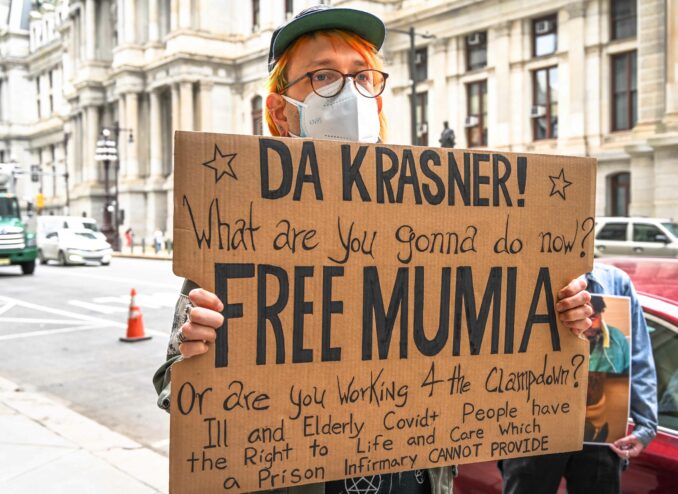Black Lives Matter movement sparks electoral defeat for FOP

Protesters call on Krasner to “Free Mumia” in Philadelphia, March 12.
Philadelphia
For decades, the endorsement of the powerful Philadelphia Fraternal Order of Police was sought by almost every candidate running for office in the city and throughout Pennsylvania. Through the power of its purse strings, the FOP has been able to fill the courts with judges who favor capital punishment, high bail and long sentences, even for minor crimes. It could count on politicians to pass “get tough on crime legislation” and to look the other way when victims of police brutality demanded justice.
In his appeals in the late 1990s before the Pennsylvania Supreme Court, Mumia Abu-Jamal requested that Justice Ronald Castille recuse himself from the case. Mumia charged bias, because Castille had a role in his case as a former Philadelphia district attorney, and he received FOP backing. Castille responded that while he took FOP money, so had all the other judges on the state’s highest court.
The protests held in 2020, led by Black Lives Matter and other racial justice advocates following the police killings of George Floyd and Breonna Taylor, exposed the role of police “unions” in blocking reforms. And they created a climate in which FOP backing has become detrimental for a candidate.
In the May 18 Democratic primary election for Philadelphia district attorney, incumbent Larry Krasner overwhelmingly defeated his FOP-backed challenger, Carlos Vega, by getting 65% of the vote. This was despite Philadelphia FOP Lodge 5 spending $140,000 to oust Krasner. This amount is more than the FOP spent in the city’s last seven electoral cycles.
The 14,000-member cop lodge donated over $113,000 to the Protect Our Police Political Action Committee, which was launched by a group of retired police in 2020 to push Krasner out of office. That PAC spent $134,000 on TV ads attacking Krasner. When it sent out a fundraising email blaming George Floyd for his own death, Vega renounced the group. But the damage to his election bid had already been done.
Exit interviews with voters found the primary election was seen as a choice between Krasner and the FOP. Vega’s loss may be the last stand for the FOP, which had backed other losing candidates in races for eight Philadelphia Common Pleas Court judge positions.
Pittsburgh: Police brutality a key issue
Police brutality impacted the primary in Pittsburgh, where “underdog” Ed Gainey defeated incumbent Bill Peduto in the mayoral race. Poised to become Pittsburgh’s first Black mayor, Gainey is favored to win the fall election in a predominantly Democratic city. Pittsburgh is, however, ranked as one of the worst places for Black people to live in the U.S. The Abolitionist Law Center found that Black people, while only 23% of the city’s population, account for 70% of arrests.
Vega, a former homicide prosecutor, was one of 31 staffers fired when Krasner took office in January 2018. Vega’s campaign repeated the FOP’s line that Krasner was “soft on crime” and somehow “responsible for a rise in homicides and violent crimes,” which have wracked Philadelphia over the past year.
Scott Roberts, who is with the racial justice group Color of Change, stated: “People want to see these prosecutors’ offices being focused on bringing down incarceration rates and holding police accountable. And they’re actually looking for other solutions for violence; they’re not willing to buy into the narrative that they hear from police unions and conservative politicians.” (The Intercept, May 18)
Abu-Jamal case exposes Krasner’s weakness vs FOP
While applauding the FOP’s electoral defeat, many progressive activists continue to criticize Krasner for refusing to stand up to police in the appellant case of political prisoner Mumia Abu-Jamal.
In February 2021, Krasner filed briefs with the Pennsylvania Superior Court arguing against Abu-Jamal’s current appeals. He upheld decisions made in the mid-1990s by “Hanging Judge” Albert Sabo, a virulent racist.
In an interview with The Jamal Journal May 21, Abu-Jamal’s spiritual adviser, Mark Lewis Taylor, founder of Educators for Mumia Abu-Jamal, criticized Krasner for rubber-stamping every decision Sabo made at Abu-Jamal’s1982 trial and his subsequent Post Conviction Relief Appeal hearings.
Taylor told the Journal: “All of Sabo’s courtrooms show at least a potential for racial bias, as well as many comments that offer clear evidence of racial bias. Krasner also knows that the bar for tolerating racial bias in courtrooms is set exceedingly low. . . . [yet] Krasner shows no interest in lowering the unfairly raised bar against Mumia. To perpetuate the state’s performance of that exception is to fail to be a prosecutor ‘for the people’ of Philadelphia.”
While even limited judicial reforms are welcome, there is little ground for hoping that the election of “progressive” prosecutors will make any serious long-term dent in the criminal injustice system. Both Krasner’s initial win and his successful bid for re-election resulted from a broad, multinational and diverse movement which has mobilized against racial injustice and police brutality. It is this movement, not Krasner, that holds the greatest potential for bringing about systemic change.

